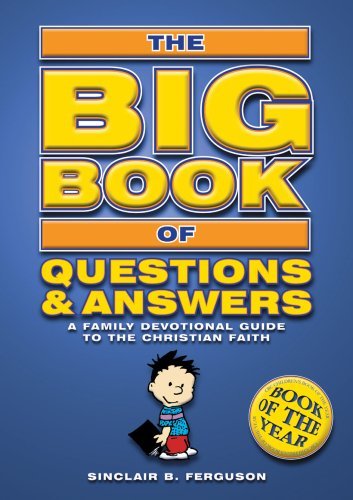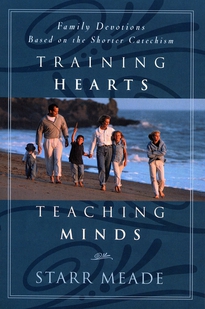
In God’s providence, a great benefit of living in the 21st century is the ready access we have to a wealth of sound biblical reading material. For families looking to start the new year with biblically robust family devotionals, two excellent works include:
- For young families, with children ages 9 and under: The Big Book of Questions & Answers: A Family Devotional Guide to the Christian Faith by Sinclair B. Ferguson
- For older families, with children ages late elementary through high school: Training Hearts, Teaching Minds: Family Devotions Based on the Shorter Catechism by Starr Meade
What is Family Worship?
Family worship is a daily time when father, mother, and children gather together to worship God by reading the Bible, praying, and singing God’s praises. It is an important way Christian parents teach their children the basics of the Christian faith. While family worship does not need to be elaborate, it does benefit from parents’ thoughtful preparation and perseverance. Since families, including my own, struggle to be consistent and faithful in this daily means of grace, it is helpful to have biblically rich material to read together.
The Big Book of Questions & Answers
 For young families seeking to establish and practice family worship, Scottish theologian Sinclair Ferguson’s The Big Book of Questions & Answers is an excellent place to start. The work is arranged in a catechism format, which means it is a handbook of simple questions and answers, designed to teach children ages 9 and under the basics of the Christian religion. The 77-biblically-based questions are organized into ten chapters.
For young families seeking to establish and practice family worship, Scottish theologian Sinclair Ferguson’s The Big Book of Questions & Answers is an excellent place to start. The work is arranged in a catechism format, which means it is a handbook of simple questions and answers, designed to teach children ages 9 and under the basics of the Christian religion. The 77-biblically-based questions are organized into ten chapters.
Questions build incrementally on one another and provide a primary-level understanding of the Christian faith. Ferguson covers the following subjects: God as our Creator, the Fall, God’s plan to save his people, who is Jesus, the Beatitudes, the Ten Commandments, the Bible, the Lord’s Prayer, the Church, and Jesus’ second coming.
In Chapter 1 “God is our Creator,” Question 1 asks: “Who are you?” Since this is a workbook for children, the answer is a fill-in-the-blank response: “I am ______.” At the start, your child personalizes the book by writing his name in it. Because young children are hands-on and enjoy writing in books when allowed, this is a fitting way for your child to become invested in the book. Our copy at home has our son’s 7-year-old penmanship.
Next, the workbook provides a simple explanation of the question, accompanied by a memory verse: “I will praise you because I am fearfully and wonderfully made” (Psalm 139:14). Question 1 concludes with:
- Bible passage to read (Genesis 2).
- Points to discuss with your child (how God makes each person unique, including the color of our eyes and how we smile).
- Suggested activity (looking in the mirror and drawing your picture).
- Prayer of thanksgiving to God for making us.
Each question in the workbook follows this simple format.
Parents will find The Big Book of Questions & Answers rich in biblical truth and a helpful family guide to the Christian faith. Not only does the workbook contain substantive Christian doctrine; moreover, its success lies in structuring these basic doctrines into a simple format that children find inviting, with age-appropriate explanations and endearing pictures. In my daughter’s early elementary years, I remember walking past her room and seeing her deeply engaged in this book.
Training Hearts, Teaching Minds
 For families with tweens (10-12 years) and teenagers (13-18 years), Starr Meade’s Training Hearts, Teaching Minds is an outstanding family devotional based on the Westminster Shorter Catechism. Meade, a mother of three grown children and six grandchildren, is the author of ten books. In addition, she has worked as a Christian school teacher, instructing Bible and Latin classes.
For families with tweens (10-12 years) and teenagers (13-18 years), Starr Meade’s Training Hearts, Teaching Minds is an outstanding family devotional based on the Westminster Shorter Catechism. Meade, a mother of three grown children and six grandchildren, is the author of ten books. In addition, she has worked as a Christian school teacher, instructing Bible and Latin classes.
Meade opens the work by explaining that in a world of confusion and falsehood the church is “the pillar and support of truth” (1 Timothy 3:15). For Christian parents, the training of their children to continue to be “the pillar and support of truth” in the next generation is an essential duty. To that end, Meade introduces the Westminster Shorter Catechism’s 107-questions-and-answers to teach young people fundamental Christian doctrine.
With six days of readings per catechism question, the work is designed to cover one question per week, with the ultimate goal of finishing the catechism in two years. Each reading is brief, taking into account short attention spans and the busy lives of modern families. While succinct, the readings are full of biblical truth and explanation. Meade writes in clear and concise language. Her years in the classroom teaching students and her experience in the home as mother and grandmother, are evident in the compelling examples she uses to illustrate and reinforce the biblical truths summarized in the catechism.
Readings on the Tenth Commandment
Our family recently explored the devotionals on Question 81.
Q.81 What does the tenth commandment forbid?
A.81 The tenth commandment forbids any dissatisfaction with what belongs to us, envy or grief at the success of others, and all improper desire for anything that belongs to someone else.
To expound on the contentment God teaches us to have in the tenth commandment, Meade writes about God’s Old Testament people and their dissatisfaction with the manna he provided in the wilderness (Numbers 11:4-6). Furthermore, to demonstrate how the tenth commandment forbids all improper desire for anything that belongs to someone else, Meade includes the biblical account of how King Ahab coveted his neighbor Naboth’s vineyard. King Ahab’s covetous thoughts ultimately led to the act of murder as he had Naboth falsely accused of cursing God and the king, and subsequently, had Naboth stoned to death so that he could acquire the vineyard (1 Kings 21). This Bible story highlights the importance of the tenth commandment because it illustrates the danger of covetous thoughts and attitudes. When these sinful thoughts are not confessed and repented of, they grow and manifest into sinful acts.
The readings on the tenth commandment challenged each member of our family and provided a catalyst for thought-provoking discussion during family worship. Collectively, we each admitted to struggling with this commandment and acknowledged how great our need for Christ is. Lastly, perhaps the greatest praise I can give to Starr Meade’s Training Hearts, Teaching Minds is my 11-year-old daughter’s review: “It teaches me about the Bible in ways I can understand.”
Final Thoughts
Sinclair Ferguson’s The Big Book of Questions & Answers and Starr Meade’s Training Hearts, Teaching Minds are both excellent guides to use for family worship. These devotional works are not just for fathers and mothers. If you are a grandparent, aunt, or uncle, who can invest time in a young person’s life, these outstanding materials will help you pass on biblically rich doctrinal truth to the next generation. The books are available on Amazon and wtsbooks.com.